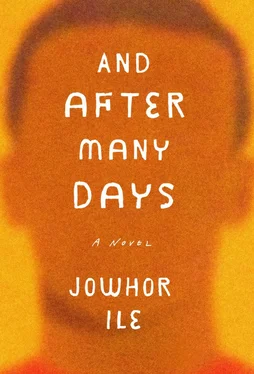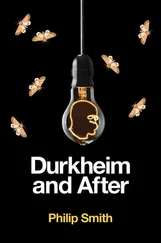Bendic was more thorough. Ajie would give his version of what happened, then Bibi would give hers, after which Paul would be called in as independent witness. If the stories contradicted each other, as they often did, Bendic would ask if there were parts of their accounts they wished to amend. It was a slow and thorough, courtlike process, but at the end, Bendic always found out who started the provocation. You reported a fight to Bendic only when you wanted your adversary singled out and punished, then yourself vindicated. But there you were, standing, trying to hold on to an aggravation that had long since disappeared. Blinking like a wall gecko.
“So why didn’t you wait to report this, Bibi? Instead, you took laws into your hands and attacked your brother.”
“But he looked for my trouble first.”
“Where did you keep it?”
“What?”
“Your trouble, where did you keep it?”
Ajie could see the heat Bibi was coming under and hid his smile, looked down and held his hands together. Too much happiness can make you uncomfortable.
“Are you saying you can’t control your anger?”
“I can,” Bibi answered, her face thorny, like an open sack of nails. Her eyes reddened and began to fill up.
Then it was Ajie’s turn, and you could easily see Bibi unknot as his motives were interrogated. The hem of her pinafore lifted and danced a little as she moved her weight from one foot to the other.
Even Paul never got off easy when he was a witness to a fight. “So, Paul,” Bendic would say, now a bit weary but resolute, “you think it’s fine to stand by and watch as your siblings pummel each other to death?”
“No, sir.”
“Then what? Was there nothing you could have done to stop this silly argument from resulting in a fight?”
A long silence followed.
“Are you deaf, Paul? Or am I not speaking loudly enough for you?” The doors creaked at the harshness of Bendic’s voice, and the parlor filled up with smoke.
Ajie could feel the blood pounding inside Paul’s head, the mad beating of his temples, and the roaring going on inside him: I didn’t do anything! It’s not my fault!
Bendic restrained his anger, reined it in with a deep breath, his voice mellowed. “Okay, explain yourself.”
“It was supposed to be a joke, but Bibi wasn’t finding it funny, and she warned Ajie to stop. Ajie didn’t, so she tried to make him.”
“Make him what?”
“Make him stop, maybe.”
“How?”
“I’m not sure. She grabbed his neck.”
“She grabbed his neck,” Bendic echoed. “And you sat and watched?”
No answer.
“Yes or no?”
“Well, yes. I tried to stop them, but I wasn’t quick enough.”
“I’ve said it many times in this house, that you are responsible for the actions you take as well as the actions you should — or could — have taken but didn’t. What would have happened if you had injured yourselves in the process?” Bendic continued. “You think your mother and I would be happy to find you wounded or constantly replacing torn clothes? You think this is what we like to return home to every day?”
One particular evening while they were having an after-fight session, Paul walked over to where the clothes were lying on the floor — a pile of evidence — between where they stood and where Bendic sat in the puffed leather chair in his study, and picked up the clothes. “I will mend them,” he said.
Paul was able to do this type of thing. He could muster the courage and take the initiative, and it would seem natural — like this was what people did or were supposed to do: They stepped forward before judgment was passed on them; they accepted the blame and decided all by themselves what amends they would make.
Ajie tried to copy this code once, and it backfired. He had broken a new boy’s pencil at school by accident, and the boy had gone to complain to the teacher. When Ajie was summoned and interrogated, he told the teacher that it was an accident, he was sorry and planned to replace the pencil the next day. The teacher looked him up and down and asked who he thought he was to talk like that. “You go about destroying people’s property and then tell them you can replace it? Ajie Utu!” She reached down for her cane, asked Ajie to stretch out his hand, and delivered three stern strokes. His school report at the end of that term said, “Should learn to respect the property of fellow pupils.”
In the year Bibi turned nine and Ajie seven, their fighting stopped. Bendic, working on what he said was a very serious case, had come home straight from court and witnessed the final stages of a major brawl. The living room furniture was in disarray, books scattered about the floor, slippers came slicing through the air. Bendic’s voice boomed from where he stood by the door and knocked the fight out of them. Ajie had scratches all over his face; Bibi had a bruised lower lip.
“It will never happen again,” was how Bendic put it. “Not in this house…to return and hear that there has been a fight.” He didn’t let anyone take his briefcase from him, or the black gown held in the crook of his arm. He stood there in the middle of the mess they had made. “You are both old enough to resolve your differences without having to resort to blows.” There was no room for courtroom dramas that day, no careful interrogation and weighing of actions. Bendic was fed up with the fighting and simply outlawed it.
Ajie and Bibi never fought each other again, at least not in their usual physical ways. They invented other methods of combat.
Ajie, however, carried on fighting at school. Twice that term, at least. Nnaemeka Anigwe, an overweight boy with breasts, knocked the biscuit out of Ajie’s hand during break time and ran off with it. Ajie chased after the boy, tripped him, and they both crashed on the ground. They struggled. Ajie tried to pry the boy’s mouth open to force out the brown mash, but he bared his teeth and swallowed again and again, determined to seal his victory. So now what? Ajie wondered. Was he to let this boy get up, dust himself off, and walk?
Then there was Lara Gasper, who pointed at him one afternoon, covering her nose with her other hand, and then told the class he had farted. All eyes turned to Ajie. He hadn’t even been aware anyone had farted. And now that all of Primary 3B was looking at him, should he glare about in clear-conscience surprise and say, “No, I didn’t fart,” “It wasn’t me”? Or yield his rear for them to sniff his shorts? Ajie was still pondering his options. He didn’t know when he slapped Lara hard across the face. He simply heard the sharp ring of the slap and the dead silence that followed, as if every other sound had been sucked out of the classroom. He looked around and saw the gasping students, the shock on Lara’s face, and realized what he had done. He stilled himself from an instant show of regret. Why should she go about bearing false witness? he thought. Lara grabbed his shirt and rained some quick slaps on his chest, but her eyes were brimming, so she ran off to complain. The teacher, Mr. Dike, made him face the wall, kneel down, raise his hands, and apologize after he had spent all of the free period on his knees. Ajie felt sorry and did apologize, but the stupid girl, Lara, said she couldn’t quite hear him. “Audible!” Mr. Dike bellowed from the back. “I said, be audible!” So Ajie said the words again, this time loud and slow. “ I am very sorry, Lara. I will never, ever do that to you again or to anybody else.”
As he walked back to his seat, he wondered if this incident would get into his end-of-term report. He imagined the hurt in Bendic’s eyes. You hit a fellow pupil, what are you turning into? Right under my roof. Bendic’s disappointment, anger, and concern all rolled into that unreadable, serene quality that could be mistaken for leniency. Ajie resigned himself to fate. The worst could happen: Bendic would hear of his misconduct and then use him as an example for his siblings. He might flog Ajie (something he had never done), or he might stop paying his school fees, send the money to a child in the village or one of those boys who hawked meat pie and bread on Aba Road; a child who, because of what he had suffered, would better appreciate a good education and show some gratitude for it. My hands are tied, Ajie imagined Bendic saying, but this is the only way you can learn .
Читать дальше












